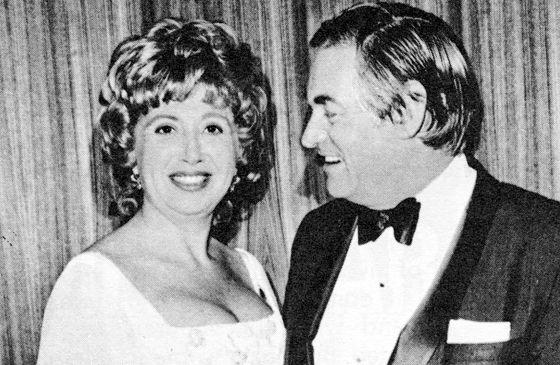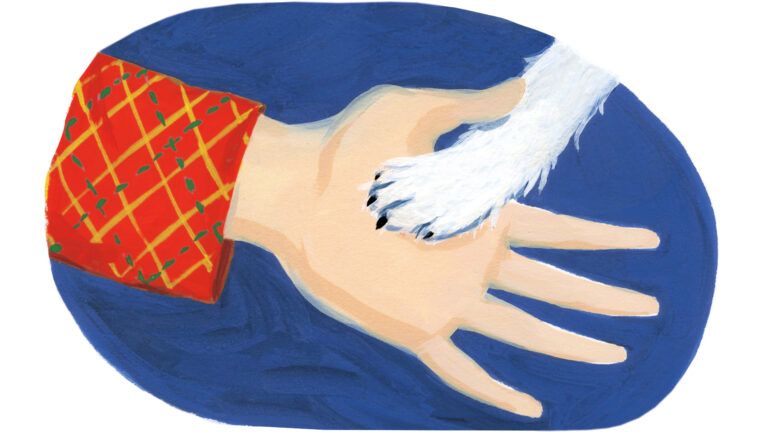How strange it is that happiness and despair can be so close together. An intense feeling of joy had come over me right in the middle of the evening performance. There was this warm, close bond between me and the audience. Everything seemed to sparkle.
I glowed all over, loving the feeling of being able to sing well, to have the sound just pour out of me, to be lost totally in the talent God had given me. This is happiness, I had thought to myself.
Yet only hours later I knew I would trade my success and career without one regret if it could make my children healthy.
My husband, Peter Greenough, and I have two children. Meredith, nicknamed Muffy, was born in 1959. Peter Jr., called Bucky, was born two years later.
Muffy has always had a bright mind. As a child she would thumb happily through books and make sense of pictures, but she never spoke. Tests showed that she was almost totally deaf.
Soon after Bucky was born, we learned that he is an epileptic and severely retarded. There has been little communication with him.
And so I asked the agonizing, self-centered question, “Why me, God?” I was so full of self-pity that when I walked along the street I’d say to myself, “Who in this crowd is suffering as much as I?”
When that self-centered period faded somewhat, I asked the bigger question, “Why them? What did those precious innocents do to deserve this fate?”
I quit singing and spent nearly two years at home trying to grope through a fog of confusion, trying to be just a mother and a wife. This was the period when my own mother’s faith helped me a great deal.
As a child I remember a certain ritual she and I would share as I went off to school. She would give me three kisses and I would say, “Mama, pray for me.”
I still seek her prayers. I’ll phone her anytime during the day and ask, “Before you go to bed tonight, mama, will you take care of something for me?” I’ll tell her the problem and then say, “Pray hard.” And we both do.
When I was going through this period of doubt and despair, my mother would say, “In God’s sight your children are perfect. No flaws. We must see them as He does.”
She’s 69 now and she is always cheerful. One day she scolded me, “Why do you try to carry the whole world on your shoulders? Leave some of it to God. Don’t you see that He’s eager to help you?”
Slowly I began to believe it. I began to talk to God personally the way Mama does. I’d talk to Him about the hurt I felt and ask Him to take it away. And then I began thanking him for the small victories.
With Bucky every little accomplishment is a major triumph. He wasn’t toilet-trained until he was five. He didn’t learn to feed himself until he was six. We had been told he would never be able to do either.
It’s a good thing we decided to put Bucky in a special school for retarded children. When he was nine he had a grand mal seizure. His quick-thinking gym instructor brought him around with mouth-to-mouth resuscitation. Bucky’s heart had stopped beating and he had been dead for 30 seconds.
The seizures he’s had over the years have not decreased in number; each one does more damage to his brain. Yet at 11 years of age he is a big strapping boy who appears quite normal. Anyone who meets him for the first time doesn’t know the difference–for a few minutes anyway. Bucky has no speech.
It’s hard for me to have him away at school but I know his daily schedule so well I can feel close to him. When traveling, I wear two watches; one is set to the time zone I’m in, and the other to the time zone Bucky’s in so that I can relate to what he’s doing at any time of day.
With Muffy the progress has been greater, the victories more numerous. There was the time when she was almost two that she got close to a hot stove. I pulled her away just in time and screamed, “Hot! Hot!”
The words broke through and her face lit up like a Christmas tree. For the rest of the day she went around saying, “Hot, hot,” as if she had discovered America.
When she was old enough, we enrolled her in a nearby school for the deaf. Today at 14 she attends a regular school. She’s studying Latin among other things. It astonishes me that a child who had almost insurmountable difficulties with her native language should be doing well in Latin.
Muffy can also lip read perfectly. When I sing to her, she knows every word. She likes to put her fingers against the speaker of a phonograph and “feel” the music, though for her the sound is distorted.
She will ask what kind of music it is, and if it’s rock, she’ll break into one of those dances that kids do–in perfect rhythm.
If it’s Mozart opera, Muffy will strike the exact pose I take on stage and imitate my trilling in a high soprano. It’s strange, but wonderful.
She has been on the same stage with me in opera productions, once carrying a candle in Lucia di Lammermoor and then a duck in Manon. Today Muffy acts so normal that I’ve almost forgotten she’s deaf.
Once I told Mama how ironic it was that one who loves music so much and sings it in the best opera houses around the world should have a child who can’t hear it.
“But see how wise God is,” she replied. “Who would work harder than a gifted singer to bring beautiful music to someone who can’t hear it?”
My husband, Peter, has been strong and understanding through all of this.
When I left my career to be with both children those first painful years, he was patient with my preoccupation with them, but after a year or so advised that I could not love their afflictions away, that it would be best for all of us if I returned to using the gifts God had given me.
Julius Rudel, director of the New York City Opera, was also patient and compassionate, but he agreed with Peter and reminded me gently that I did have a contract.
Once back in the public eye, Peter and I faced a decision. Do we refuse to discuss our children publicly, or do we openly admit our heartache in hopes that it will be helpful in some way to others?
The answer we seemed to receive to this prayer was that we should be open and vulnerable about our experiences.
Then came a kind of freedom. And an end to bitterness. I felt that if I could survive my grief I could survive anything.
Soon, in connection with my work with the Mother’s March on Birth Defects, I found myself on the speaker’s platform facing mothers with retarded children, mothers who had the same despairing look on their faces I used to have. I speak to them frankly about what will happen to their babies.
“We already know what happens to the mothers,” I say with a smile. “We get prematurely old.”
Somewhat to my surprise I found a new self-confidence in my work. Opera is a combination of drama and music, and I love to throw myself into the tragic roles of those meaty characters. The years of heartache made it easy for me to do this.
Friends warned that I should protect my voice more, that too much involvement with drama might shorten my career. But there is no way for me to avoid that kind of involvement.
I don’t think any of us understand why our children are afflicted. But I have come to see that suffering somehow is an important part of God’s grand design for us. He gives each of us certain gifts and puts us in the world for a measured time. But we are not puppets on a string.
We have freedom to make choices, good or bad. We are subject to hurts and illness. We have joys and sorrows. But God is not some uncaring force; I believe He hurts when we hurt because He loves us.
If I didn’t feel this way I couldn’t talk to Him the way I do. Nor could I thank Him for helping me to rediscover joy and to pass it on to others.
Did you enjoy this story? Subscribe to Guideposts magazine.






